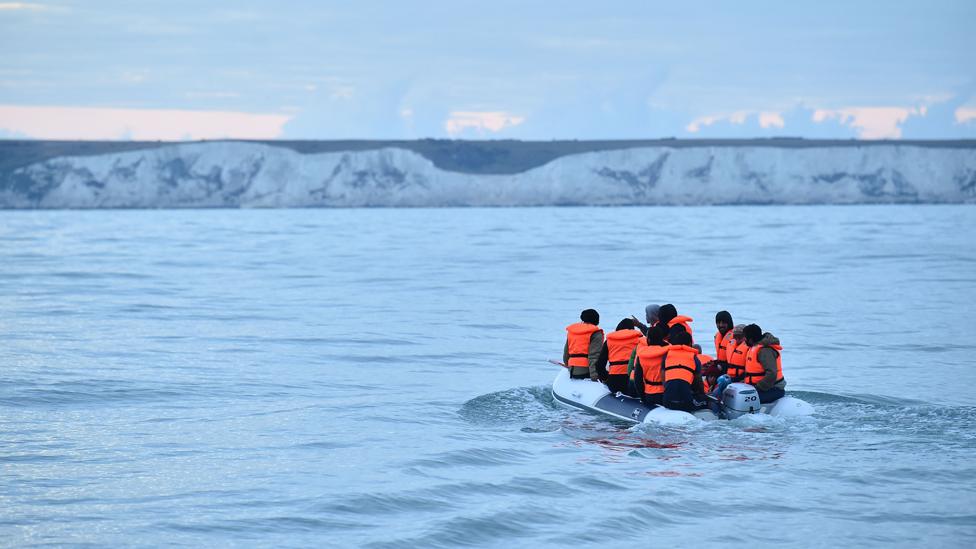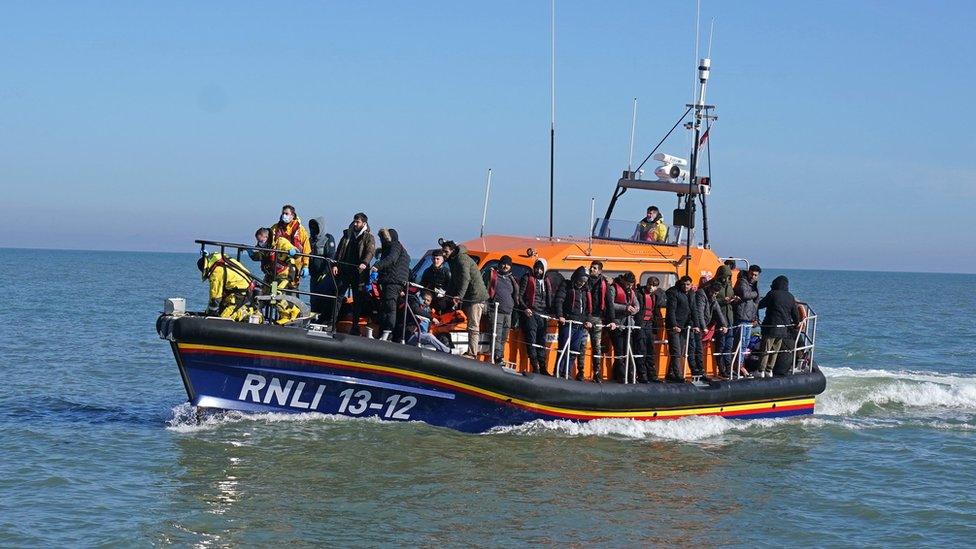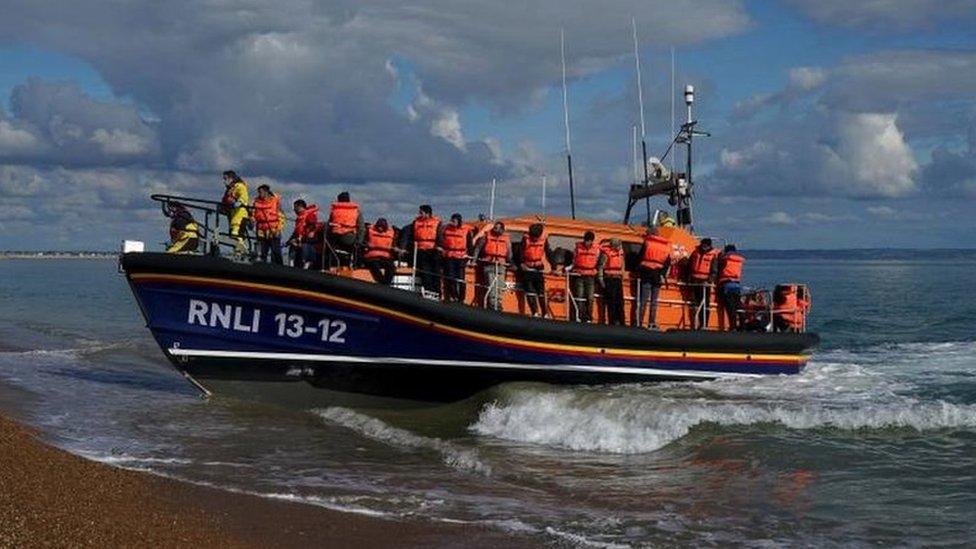Stop using hotels to house migrant children, say charities
- Published

More than 100 charities have written to Rishi Sunak calling for an end to housing child asylum seekers in hotels, after about 200 went missing.
The organisations warned the prime minster that children were at risk of exploitation, with one calling it a "child protection scandal".
There is concern children are being trafficked into criminal gangs.
The government said it was "determined to stop the use of hotels" for all children.
Commons leader Penny Mordaunt said there had been "stories of gangmasters turning up at hotels" and "taking people away".
It is "very hard" to protect vulnerable asylum seekers and it needs to be addressed, she told MPs.
An unaccompanied asylum-seeking child is a person under the age of 18 who has become separated from both parents at the time of their asylum application.
Immigration Minister Robert Jenrick told MPs on Wednesday that of the 4,600 child asylum seekers without an adult who had arrived in the UK since 2021, 440 had gone missing and only half had returned.
He said 13 of those who were missing were under 16 and one was female.
He clarified he had not seen evidence that children were being abducted but said he was "not going to let the matter drop".
The government said almost nine in 10 unaccompanied children in Home Office-approved hotels were Albanian males who claimed to be 16 to 17 years old.
Police sources said many had been trafficked by criminal gangs.
Charities have raised fears that children disappearing from hotels are ending up in drug gangs or car washes.
Dame Sara Thornton, the UK's former Independent Anti-Slavery Commissioner, said it was known that organised crime groups targeted vulnerable children, and asylum-seeking children were at "great risk of exploitation and trafficking".
"My real fear is that the boys will be locked into cannabis farms, they might be working in county line drugs distribution and the girls may be forced into sex work."
Dame Sara, who also had a long career as a police officer, said the practice of keeping children in Home Office run hotels "needs to stop".
Speaking on BBC Radio 4's Today programme, she said: "You've got a lot of children in certain hotels, people know where they are, the traffickers know where they are. If they were living in supported foster homes it would be so much harder for them to be preyed on in the way that is happening."
The open letter, co-ordinated by children's rights organisation ECPAT UK and the Refugee Council, and signed by more than 100 refugee and children's charities including the NSPCC and Barnado's, condemned the government's "failures to protect vulnerable children from harm".
The letter said: "There is no legal basis for placing children in Home Office hotel accommodation, and almost two years into the operation of the scheme - which is both unlawful and harmful - it is no longer possible to justify the use of hotels as being 'temporary'."
The charities added that the Home Office had "repeatedly failed" to commit to an end date for the scheme.
They have also called for an independent inquiry into the situation.
But Mr Jenrick stressed that a shortage of alternative accommodation meant he could not set a date.

Who is responsible for child asylum seekers?
Under-18s travelling on their own are called "unaccompanied asylum-seeking children"
More than 3,000 child applicants were granted some form of protection in the year to September 2022
All UK local authorities are responsible for child asylum seekers in their area
They can transfer children to other areas when capacity is stretched
Local authorities can receive up to £143 per night to accommodate each child
The Home Office says some children are in hotels because alternative accommodation is unavailable

Enver Solomon, chief executive of the Refugee Council, described the loss of dozens of refugees as "a child protection scandal" that must be urgently addressed.
He said the "equivalent of several classrooms of children" had seemingly "disappeared into the clutches of those who will exploit and abuse them".
Labour's shadow home secretary Yvette Cooper also accused ministers of a "dereliction of duty" and claimed there was "a criminal network involved" in taking children away from their accommodation.
She told the BBC about 40% of the missing children had disappeared from one hotel and the government had done nothing.
Caroline Lucas, Green MP for Brighton Pavilion - where a number of children are thought to have gone missing - accused the government of "staggering complacency" and compared the situation to girls being ignored in Rotherham, a reference to the widespread child sex abuse in the Yorkshire town.
Sussex Police said 137 unaccompanied children had been reported missing since the Home Office began housing them in hotels in Brighton and Hove.
On Wednesday night, a protest was held in Brighton by refugee groups demanding "urgent action to give children seeking safety the protection they deserve".
In a statement, the Home Office said: "The wellbeing of children and minors in our care is an absolute priority."
"Robust safeguarding procedures are in place to ensure all children and minors are safe and supported as we seek urgent placements with a local authority.
"Any child or minor going missing is extremely serious, and we work around the clock with the police and local authorities to urgently locate them and ensure they are safe."
The statement added that the government was determined to stop the use of hotels for all minors and pointed out it was giving local authorities £15,000 for every unaccompanied child they take into their care.


If you have information about this story and would like to talk to a BBC journalist in confidence, you can do so by emailing haveyoursay@bbc.co.uk, external.
Please include a contact number if you are willing to speak to a BBC journalist. You can also get in touch in the following ways:
WhatsApp: +44 7756 165803
Tweet: @BBC_HaveYourSay, external
Please read our terms & conditions and privacy policy
If you are reading this page and can't see the form you will need to visit the mobile version of the BBC website to submit your question or comment or you can email us at HaveYourSay@bbc.co.uk, external. Please include your name, age and location with any submission.


AMANDA AND ALAN'S ITALIAN JOB: It's demolition mixed with la dolce vita...
LORD SUGAR'S NO-NONSENSE BOARDROOM IS OPEN: But whose story has reached 'The End'?

- Published24 January 2023

- Published23 January 2023

- Published13 October 2022
